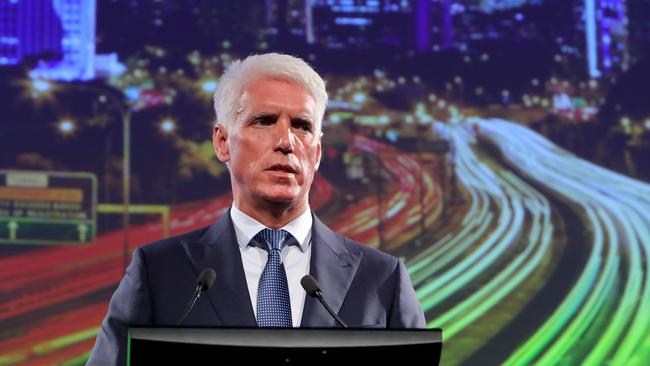Transurban keen for US-style ‘hot lanes’
Transurban chief executive Scott Charlton says the toll road giant is keen to build US-style “hot lanes” on Australian arterial roads.

Transurban chief executive Scott Charlton says the toll road giant is keen to build US-style “hot lanes” on Australian arterial roads and says the company’s experience in America debunks the myth that only wealthy people use tollway express lanes.
Transurban’s $US475m ($697m) 395 Express Lanes Project, a 13km extension of the 95 Express Lanes in the US state of Virginia to the Washington DC border that enhances access in the Pentagon precinct, opened to drivers this morning on time and on budget.
The Express Lanes are tolled and use innovative dynamic pricing, with toll rates based on traffic speed and density to keep traffic moving. They operate alongside free lanes.
Vehicles that have three or more people as well as motorbikes and buses travel free on the express lanes at all times.
The tolls collected also subsidise public transport on the road. About $US15m of annual funding from toll revenues is this year providing an expanded bus service that will move an additional 700 people through the i95/i395 corridor every day and save close to 89,000 hours of travel delay each year.
“A similar concept could be done here in Australia with bus lanes or transit lanes. A fair part of the day they are not occupied. Could you pay to access those if you get a better run? There could be options for some of the major roads to use express lanes,’’ Mr Charlton told The Australian.
“We have always struggled with the politics here because there is a misconception in Australia this type of thing would just be for the wealthy.”
Mr Charlton said Transurban’s analysis showed the average user of the i395 drives a Toyota Camry, uses the road two or three times a month and pays less than $US20 over a month in tolls.
“When they do use the road they are time-poor and need certainty of travel time. The express lanes are well received by the customers because there is always a free option,’’ he said.
He said the firm would love to do something in Australia.
“People see the benefits, they understand what they are paying. That intersects with a wider model around a road user charging system.”
Transurban has partnered with the Virginia Tech Transportation Institute, the Virginia Department of Transportation and global carmarkers to test road infrastructure that could support the next generation of Connected and Automated Vehicles (CAVs).
The trial is part of a $US7.5m grant awarded by the Department of Transportation to advance technologies that will better enable roads to “speak” to CAVs.
But Mr Charlton said the hype around CAVs had run ahead of reality.
“You get peak hype around some new technology over a couple of years, 10-15 years before the technology actually proliferates. Just look at mobile phones or television. When we get out to the middle of the 2030s you will see AVs have an impact,’’ Mr Charlton said.
“We are still running connected autonomous trials on all of our roads. The work is happening.”
He said the major arterial roads and tollways in and around big cities would be the likely places for autonomous vehicles to be used.
“But there are many issues that need to be resolved around how much does the road talk to the car, do the cars talk to each other and who is going to win the technology race — the carmakers or the tech companies,’’ he said.
Transurban has nine toll road projects under construction in Australia to be delivered between now and 2024, which remains its primary focus.
These include the first and second stages of the WestConnnex and NorthConnex projects in Sydney, as well as the Logan Enhancement in Brisbane.
But the company has previously flagged 14 potential cities in North America for its next phase of growth. In October it formed a high-powered North American advisory board.
It also moved into Canada last year with the $C840m ($930m) acquisition of the 7.2km A25 toll road and bridge connecting northern Montreal across the Riviere des Prairies to commercial and residential areas.
Transurban’s share price has risen steadily over the past 12 months from below $12 to close on Friday at $15.11. The shares reached over $16 in early August.
Last week the company made Fortune magazine’s Future 50 index, the only Australian-owned organisation on the list.
It came in at number 30, one spot ahead of multinational retail juggernaut Amazon.
Fortune magazine teamed up with management consulting firm BCG to analyse dozens of factors to identify the 50 companies with the strongest long-term growth potential.




To join the conversation, please log in. Don't have an account? Register
Join the conversation, you are commenting as Logout